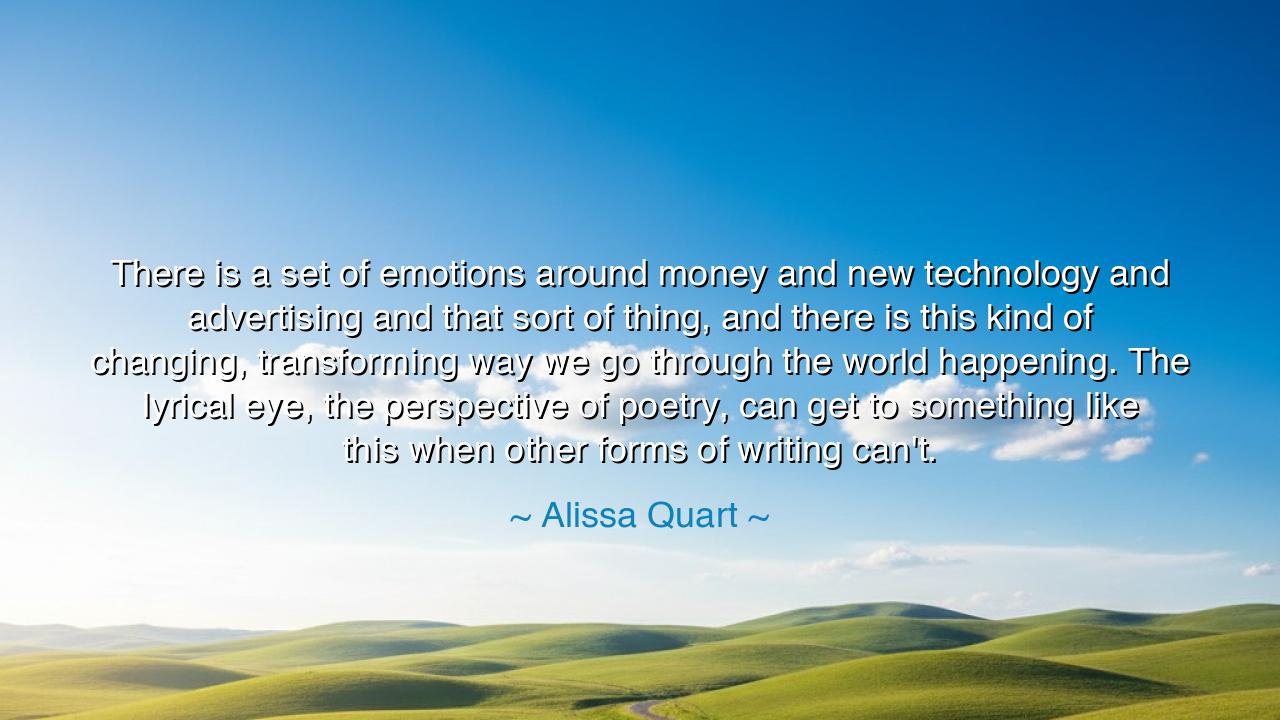
There is a set of emotions around money and new technology and
There is a set of emotions around money and new technology and advertising and that sort of thing, and there is this kind of changing, transforming way we go through the world happening. The lyrical eye, the perspective of poetry, can get to something like this when other forms of writing can't.






Alissa Quart, a seeker of truth in words, once declared: “There is a set of emotions around money and new technology and advertising and that sort of thing, and there is this kind of changing, transforming way we go through the world happening. The lyrical eye, the perspective of poetry, can get to something like this when other forms of writing can’t.” Her words shine a lantern on a deep truth: that the modern age, with its glitter of commerce and flood of technology, does not merely change what we see but how we feel, how we live, how we imagine. And in the midst of this storm, it is poetry, not data nor dry prose, that pierces to the heart.
The ancients knew well that new inventions and wealth stirred the emotions of nations. When coinage was first minted in Lydia, it transformed not only trade but the very rhythms of human desire. Men became enchanted with the clink of silver, and wars were fought not for land alone but for wealth in its new, portable form. Later, when the printing press spread across Europe, advertising was born alongside scripture and literature, shaping hearts as much as minds. With each innovation, humanity’s inner life was transformed—and only the poets seemed able to capture the invisible tremors of these changes.
Quart reminds us that money and technology are not cold things, though they may appear so. They carry within them longings, fears, envy, hunger, and delight. The market advertisement is not only a message to buy; it is a mirror of what people wish for and who they wish to become. The emotions tied to such forces cannot be fully dissected by mere fact or rational analysis. They require the lyrical eye, the poet’s vision, which can reveal not only what is happening but how it feels to live through such transformations.
Consider the example of the Industrial Revolution. Historians can tell us of factories, machines, and economic shifts. But it was the poets—Blake, with his “dark satanic mills,” and Wordsworth, lamenting the loss of nature—who captured the soul of the people. They expressed the awe, the terror, and the melancholy of a world remade by iron and steam. Facts explained the mechanics, but poetry revealed the human heart trembling in the midst of change. Quart’s insight stands in this same lineage: in our own time of digital storms and relentless advertising, it is again the poets who show us how it feels to be alive.
Her words also speak of transformation, of a “changing, transforming way we go through the world.” Indeed, the smartphone in the hand, the ad that follows our every step online, the endless scroll of images and sales—these have reshaped not only commerce but consciousness. We live in an age where every act is entangled with money and technology, where the border between genuine feeling and manufactured desire grows ever thinner. To write of this only in dry prose is to miss the tremor in the soul. Only the lyrical eye, weaving metaphor and rhythm, can reveal the confusion, the enchantment, the unease.
The lesson here is clear: do not underestimate the power of poetry in an age of machines. As technology advances, as commerce tightens its hold, as advertising seeps into every corner of life, we need more than reports and analysis—we need song, vision, and the courage of metaphor. For the poet can capture the fleeting essence of what it feels like to live in such times, and through words can preserve the humanity that risks being drowned in the noise of progress.
So, dear listener, take this wisdom as your own: cultivate within yourself the lyrical eye. Do not let the world of money and technology pass you by unexamined. Seek not only to understand it but to feel it, to express it, to give voice to the inexpressible currents that move within you. For in doing so, you preserve the soul against the storm, and you leave behind not only analysis but truth—truth that sings, truth that heals, truth that endures.






AAdministratorAdministrator
Welcome, honored guests. Please leave a comment, we will respond soon